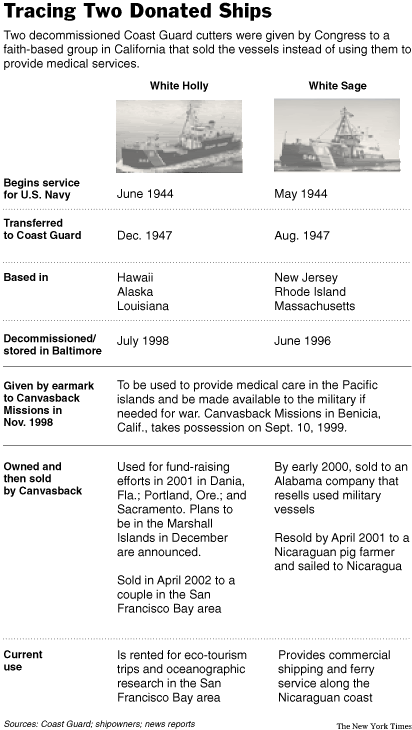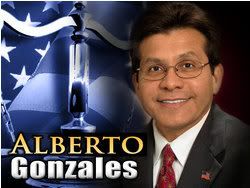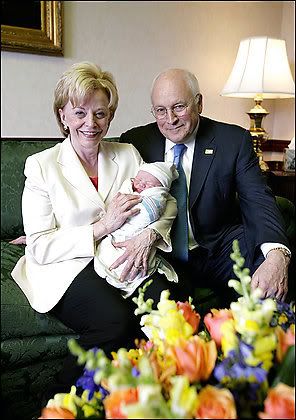Raw Story reports:
In a Senate Judiciary Committee business meeting Thursday morning, Senator Patrick Leahy (D-VT) revealed that Attorney General Alberto Gonzales once again used an interim appointment authority at the heart of the US Attorneys controversy that Congress banned in a bill sent to the President for signature on June 4.
"Senator Feinstein’s U.S. Attorney bill....repeals that portion of the Patriot Act Reauthorization that had allowed the Attorney General to circumvent advice and consent with respect to U.S. Attorneys. That bill, the Preserving United States Attorney Independence Act of 2007, has been on the President’s desk since June 4. It seems he just cannot bring himself to sign it. Instead, we were informed yesterday through the Justice Department that the Attorney General has used the power that we have voted to repeal, again," said Senator Leahy, the committee's chairman.
Tracy Schmaler, a spokeswoman for Senator Leahy, clarified the situation in an e-mail to RAW STORY.
"It just so happens the committee got notice yesterday, that on June 16, George Cardona's 210 days as Acting U.S. Attorney in the Central District of California will have run out and the Attorney General will appoint him as an interim U.S. Attorney at that time. (i.e. still using the end-run authority because Bush has slow-walked signing the bill)," she wrote.
RAW STORY could not reach the Justice Department for comment at press time.
On June 4, the Congress sent S. 214, the Preserving United States Attorney Independence Act of 2007, to President George W. Bush. The bill overturned a measure stealthily passed by the Republican-led Congress in 2006 that allowed the Attorney General to indefinitely appoint US Attorneys on an interim basis. Critics said the provision was intended to do an end-run around the standard Senate confirmation process for US Attorneys.
The bill passed the Senate by a 94-2 margin on March 20, and also cleared the House of Representatives by a 306-114 vote on May 22. The President has yet to sign or veto the bill.
Pocket veto.
Once legislation reaches the president's desk, he (or she) must sign it or veto it within ten days (not including Sundays) while Congress is in session, or it automatically becomes law. The one exception (if Congress adjourns before the ten days are up) does not apply here because Congress has been in session since it passed this legislation.
So if Bush doesn't act, exactly when does this bill become law? Article 1, Section 7 of the Constitution:
"...If any Bill shall not be returned by the President within ten Days (Sundays excepted) after it shall have been presented to him, the Same shall be a Law, in like Manner as if he had signed it, unless the Congress by their Adjournment prevent its Return, in which Case it shall not be a Law."
It hit Bush’s desk on Monday, June 4, and there has been one Sunday (June 10). The tenth day is tomorrow, Friday, June 15. After 10 days without a signature or veto, it becomes law. That means it becomes law on Saturday, June 16.
According to all news reports at the time this little known provision in the Patriot Act came to light, Bush’s and Gonzales’ statements have been that the administration never intended to use the little known slip-in to the Patriot Act to avoid Senate confirmation, and would, of course, cooperate with Congress in removing the provision.
If Raw Story’s report is accurate, what pisses me off about the Democrats is how low-key they are in exposing the lies and corruption of the Bush administration. If Leahy is right and Gonzales intends to use the provision to get around Senate confirmation (and what other reason could there be for Bush not having signed this legislation by now?), Democrats ought to be taking to microphones all over the Capitol and hold this up as “Just one more example….”
It’s because of Democrats’ failure to play hardball with Republicans, by making use of the many examples of Bush-Cheney corruption that come to light that the Rush Limbaughs and Hannitys can lie to audiences, and why we are forever playing defense, trying to convince that 29% who still love Bush and vote Republican that it’s us who are the good guys.




















